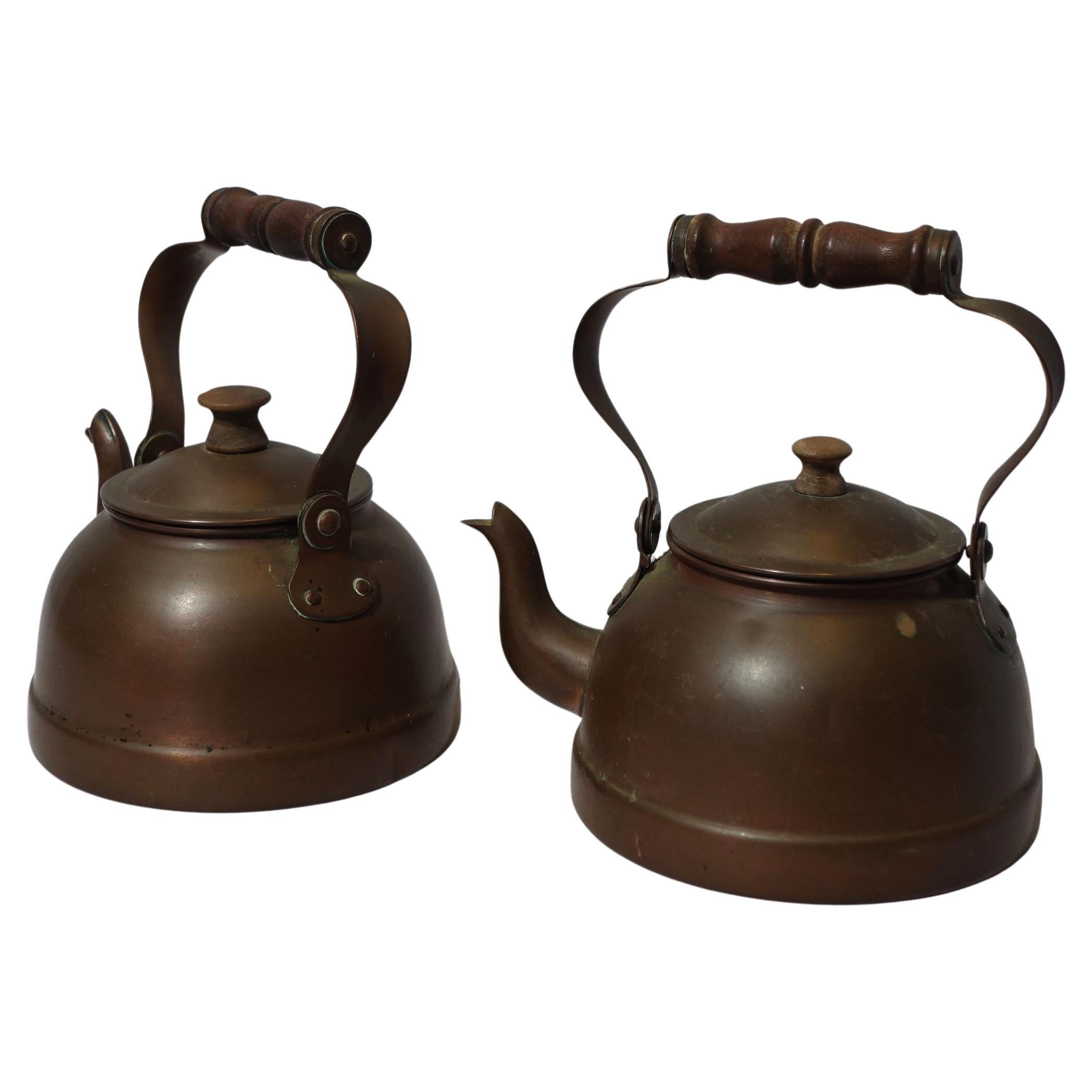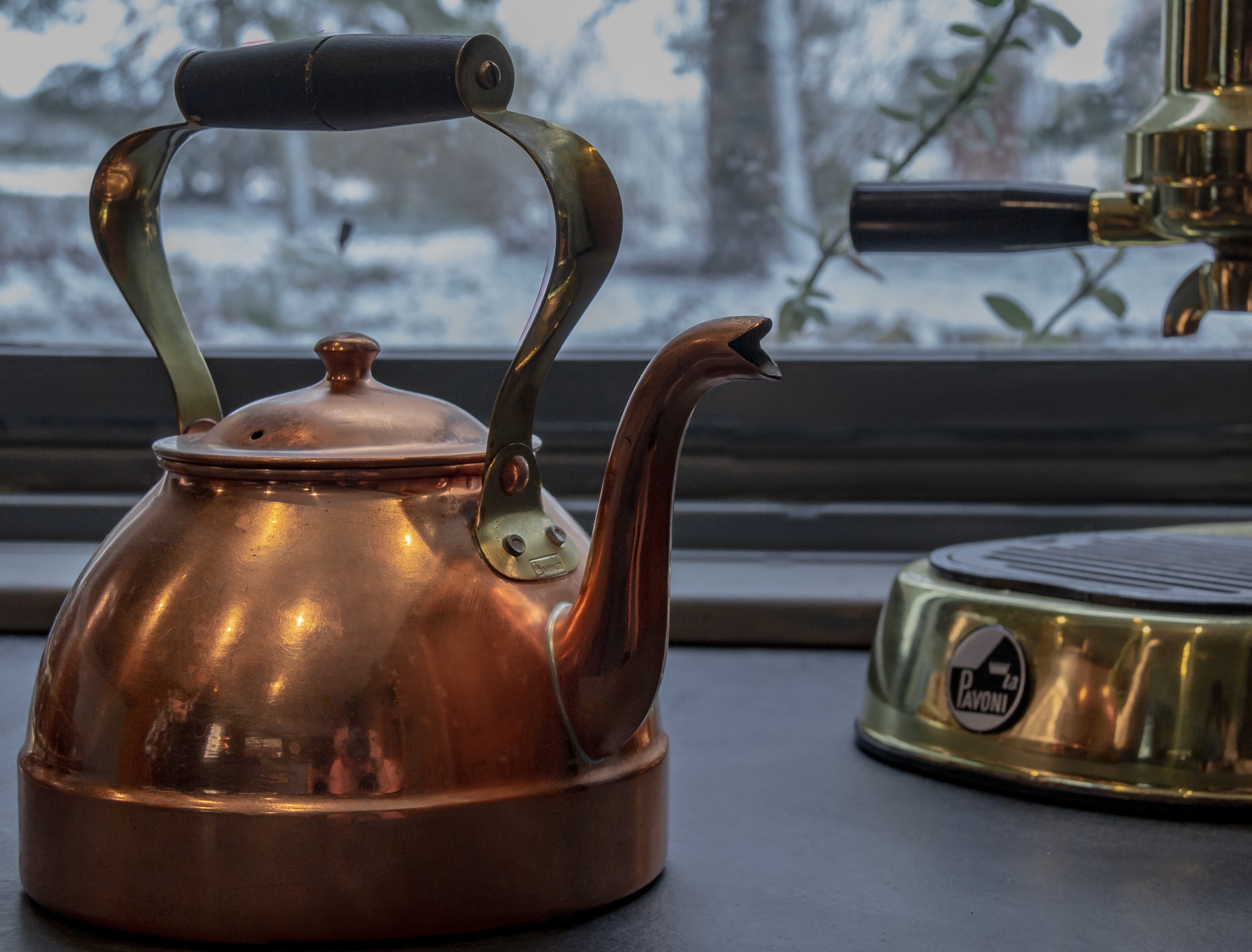Yes, copper tea kettles are safe to use for boiling water. They are lined with other metals to prevent copper leaching.
Copper Tea Kettles Safe offer efficient heat conductivity, making them a popular choice for tea enthusiasts. Copper tea kettles have been used for centuries, prized for their ability to conduct heat rapidly and uniformly. However, concerns about the potential health risks of copper leaching into the water have led to questions about their safety.
The good news is that modern copper kettles are typically lined with materials such as stainless steel or tin to prevent direct contact between the water and the copper, ensuring the safety of the boiling process. We will explore the safety and advantages of using copper tea kettles, as well as provide tips for selecting and maintaining one for your own tea brewing needs.

Credit: www.1stdibs.com
2. The Benefits Of Copper Tea Kettles
2. The Benefits of Copper Tea Kettles
When it comes to choosing the perfect tea kettle, many people are turning to copper tea kettles for their unique benefits. From their traditional aesthetics to superior heat conduction, copper tea kettles offer a range of advantages that make them a popular choice among tea enthusiasts. In this section, we will explore the various benefits of copper tea kettles.
2.1 Traditional Aesthetics
Copper tea kettles are known for their timeless and elegant appearance, adding a touch of sophistication to any kitchen or dining space. These kettles often feature intricate designs and exquisite craftsmanship that showcase the artistry of copper artisans. Their warm reddish hue and gleaming surface make them a standout piece in any tea lover’s collection.
2.2 Superior Heat Conduction
One of the most significant advantages of copper tea kettles is their exceptional heat conductivity. Copper is a highly conductive material that allows for quick and efficient heat distribution. This means that your water will boil faster, saving you precious time when preparing your favorite cup of tea.
Copper tea kettles also offer excellent temperature control, allowing you to easily regulate the heat as you desire. Whether you prefer a gentle simmer or a rolling boil, copper kettles provide optimal thermal conductivity, ensuring that your tea is brewed to perfection.
The superior heat conduction of copper tea kettles is not only beneficial for tea enthusiasts but also for professional chefs. Copper pots and pans have been prized by culinary experts for centuries due to their ability to evenly heat food.
3. Potential Risks Of Copper Tea Kettles
3. Potential Risks of Copper Tea Kettles
While copper tea kettles are prized for their heat conductivity and traditional charm, there are potential risks associated with their use. It is essential to be aware of these risks to make an informed decision about using copper tea kettles in your kitchen.
Copper Leaching
When copper tea kettles are exposed to heat, there is a possibility of copper leaching into the boiling water. This can occur when the kettle is made of pure copper or lined with tin, which might degrade over time. The leached copper can impart a metallic taste to the water and pose health concerns if consumed regularly.
Health Concerns
Health concerns arise from the potential ingestion of copper, which can lead to copper toxicity. High levels of copper in the body can cause nausea, vomiting, and even liver damage in severe cases. While the risk of copper toxicity from occasional use of copper tea kettles is low, individuals with certain health conditions such as Wilson’s disease should exercise caution.
4. Safety Measures And Precautions
When using copper tea kettles, it is essential to follow safety measures and take necessary precautions to ensure a safe and enjoyable experience. Proper cleaning techniques and regular maintenance play a pivotal role in maintaining the safety and longevity of your copper tea kettle.
4.1 Proper Cleaning Techniques
The proper cleaning of a copper tea kettle is crucial to keep it safe for use. To clean the exterior, use a soft cloth with mild soapy water and gently wipe the surface. Avoid abrasive materials that can scratch the copper. For the interior, a mixture of equal parts water and vinegar can be used to remove mineral deposits. Ensure thorough rinsing afterward and dry the kettle completely to prevent tarnishing.
4.2 Regular Maintenance
Regular maintenance is essential to maintain the safety and functionality of a copper tea kettle. Ensure that the kettle is dried completely after each use to prevent the development of mold or mildew. Additionally, periodic polishing with a copper cleaner can help maintain the luster and integrity of the kettle. Inspect the handles and attachments regularly to check for any signs of wear or loose components, addressing any issues promptly to prevent accidents.

Credit: cookingpanda.com
5. Alternatives To Copper Tea Kettles
If you have concerns about using a copper tea kettle or simply prefer to explore other options, there are several alternatives to consider. Each alternative material offers its own unique benefits and features. Let’s take a look at three popular alternatives: stainless steel, glass, and ceramic.
5.1 Stainless Steel
Stainless steel is a popular choice for tea kettles due to its durability, versatility, and safety. It is resistant to rust, corrosion, and staining, making it a long-lasting option for your kitchen. Stainless steel tea kettles also heat up quickly and evenly, allowing you to enjoy your favorite brew in no time. Furthermore, they are easy to clean and maintain, and they do not transfer any metallic taste to your tea.
5.2 Glass
Glass tea kettles are not only visually appealing but also offer a unique brewing experience. With a glass tea kettle, you can watch the water transform into a rolling boil, creating a mesmerizing spectacle. Additionally, glass tea kettles are safe to use as they do not release any harmful chemicals into your beverage. They are also non-reactive, meaning they won’t affect the taste or flavor of your tea. Glass kettles are easy to clean and provide a beautiful aesthetic element to your kitchen.
5.3 Ceramic
Ceramic tea kettles are renowned for their elegance and charm. They come in various colors, designs, and patterns, allowing you to add a touch of personal style to your tea brewing routine. Apart from their aesthetic appeal, ceramic tea kettles offer excellent heat retention, ensuring your tea stays hot for longer periods. They are also non-reactive, preserving the true flavors of your tea. Ceramic kettles are durable, easy to clean, and provide a delightful traditional feel to your tea rituals.

Credit: www.amazon.com
Frequently Asked Questions For Are Copper Tea Kettles Safe
Are Copper Tea Kettles Safe To Use For Boiling Water?
Yes, copper tea kettles are safe to use for boiling water. Copper is a good conductor of heat and distributes heat evenly, making it an ideal material for tea kettles. However, make sure your copper kettle has a food-grade lining to prevent copper from leaching into the water and affecting its taste or safety.
Regular cleaning and maintenance are also recommended to ensure its safety.
Do Copper Tea Kettles Affect The Taste Of The Water?
Copper tea kettles can slightly impact the taste of water. Small amounts of copper may leach into the water during boiling. This can give the water a slightly metallic taste. However, if your kettle has a food-grade lining or coating, it will prevent direct contact between the water and copper, minimizing any potential taste changes.
How Do I Clean And Maintain My Copper Tea Kettle?
To clean and maintain your copper tea kettle, use a mixture of lemon juice and salt to gently scrub away tarnish and stains. Rinse thoroughly with warm water and dry immediately after cleaning. Avoid using abrasive cleaners or scrubbing pads, as they can damage the copper.
Regular maintenance will help keep your kettle in good condition and prolong its lifespan.
Can Copper Tea Kettles Be Used On All Heat Sources?
Most copper tea kettles are suitable for use on gas, electric, and induction stovetops. However, it’s important to check the manufacturer’s instructions and recommendations before using your kettle on a particular heat source. Some kettles may have limitations or require additional accessories for certain heat sources, so it’s best to confirm compatibility to ensure safety and optimal performance.
Conclusion
Based on the information provided, copper tea kettles can be considered safe for use. While concerns regarding copper leaching into hot beverages exist, proper maintenance and use can mitigate any risks. Regular cleaning and avoiding prolonged exposure to heat can help maintain the integrity of the kettle.
It is advisable to consult with a healthcare professional if you have any specific health conditions or concerns. Cheers to a safe and enjoyable tea drinking experience with a copper tea kettle!
